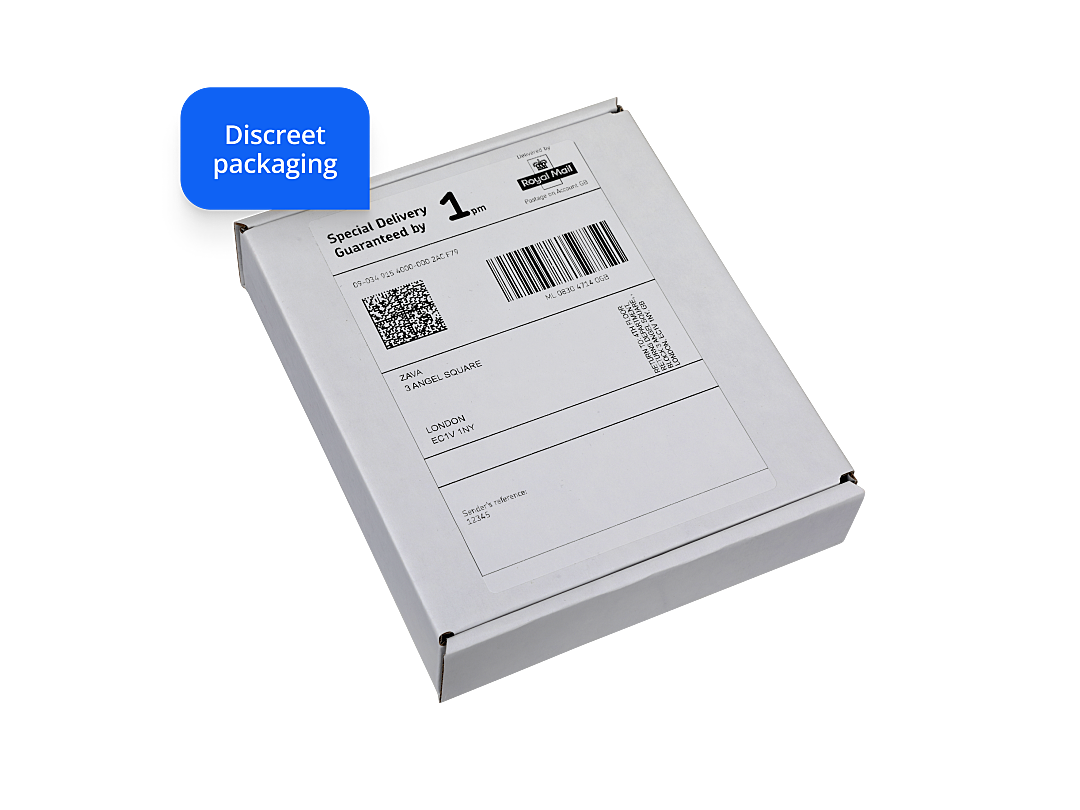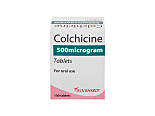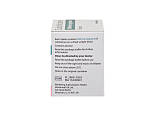





Prices from £24.95
In stock. Simply fill in a brief consultation questionnaire and one of our doctors will review your request today.
-
Colchicine tablets are used to treat gout attacks. Colchicine tablets works by stopping white blood cells from getting to the joints that are experiencing an attack, which lowers the swelling and pain. They can also be used to stop gout flare-ups when you begin treatment with other drugs, like probenecid and allopurinol.
Colchicine tablets are available as both a generic and brand name drug, such as Colcrys. The usual dose is one 500mcg (micrograms) colchicine tablet taken 2 to 4 times each day.
The active ingredient in colchicine tablets is colchicine.



About colchicine
-
-
You can take colchicine tablets to help treat or avoid gout attacks. The active ingredient in colchicine tablets is colchicine, which is an anti-gout agent.
Gout symptoms normally come on quickly and can affect one or more of your joints. Gout is caused when there is too much uric acid in your blood. This creates crystals in your joints which cause swelling and pain. Colchicine tablets can help improve joint pain brought on by your gout.
Colchicine tablets can also prevent flare-ups of Familial Mediterranean Fever (FMF) symptoms, which is an inherited inflammatory condition.
-
-
To treat gout attacks:
It is advised you take 2 colchicine tablets to begin with, followed by 1 colchicine tablet one hour later. You should not take further tablets for 12 hours. You can continue taking colchicine tablets, if necessary, with a maximum dose of 1 tablet 3 times each day until symptoms go away. You should stop treatment when symptoms go or when you have taken a total of 12 colchicine tablets. Once you have completed a course of colchicine tablets, you should not begin another course for at least 3 days.
To prevent flare-ups of gout when treatment is started with other drugs:
It is advised you take 1 colchicine tablet twice each day. For best results, you should not eat grapefruit or drink grapefruit juice while taking colchicine. You may find it is easier on your stomach if you take your tablets with or after food.
-
-
If you have gout, colchicine works by lowering the inflammation caused by crystals of uric acid in your joints.
-
-
When taking colchicine tablets, they should begin to work within 30 minutes to 2 hours. In some cases, it may take a day or two before your pain and inflammation starts to get better. For gout treatment, you usually only take colchicine tablets for a few days. You should talk to your doctor if you are not sure how long you need to take treatment.
-
-
There are side effects you can get when taking colchicine, but not everyone will get them.
You should stop taking colchicine right away and get medical help if you:
- are feeling sick (nausea) or being sick
- have stomach pain
- have diarrhoea
- have a high temperature
Other side effects that have been seen with colchicine include:
- liver damage
- hair loss
- nerve damage
- inflammation of the nerves which can cause weakness, pain, or tingling
- weakness or pain in muscles
A serious allergic reaction (anaphylaxis) when taking colchicine is rare.
You must call 999 or go to A&E right away if you:
- are wheezing
- get tightness in the throat or chest
- get a skin rash that can include red, itchy, swollen skin
- have difficulty talking or breathing
For a full list of side effects of colchicine, you should read the patient information leaflet inside your colchicine medicine packet.
-
-
Colchicine can be taken by most adults aged 18 and above. In some instances, a specialist doctor can prescribe colchicine for children. Colchicine is not suitable for some people.
To ensure it is safe for you to take, speak to your doctor if you:
- have had a previous allergic reaction to colchicine
- have severe liver or kidney problems
- have a severe blood disorder (like blood dyscrasia)
- have problems with your digestive system or heart
- are pregnant, trying for a baby, or think you may be pregnant
- have low white blood cells
Colchicine and pregnancy
Colchicine can be used if you are pregnant, although it is not often prescribed. Should you become pregnant while on colchicine, you should contact your doctor. If you are breastfeeding, colchicine is not normally used for gout. However, your doctor may suggest non-steroidal anti-inflammatory drugs (NSAIDs) like ibuprofen. If you could become pregnant, you will normally only be prescribed colchicine if you are using suitable contraception.
If you are taking any other medicines, vitamins, supplements, or herbal remedies, you should let your doctor or pharmacist know before starting colchicine.
-
-
Some medicines can interact with how colchicine works. Depending on the medicine, some can cause serious or potentially fatal side effects.
Consult your doctor before starting colchicine tablets if you take:
- erythromycin or clarithromycin (antibiotics given to treat infections)
- medicines which can affect your blood, liver, or kidneys
- atazanavir or ritonavir (antiviral medicines given to treat HIV infection)
- voriconazole, itraconazole, or ketoconazole (antifungal medicines)
- verapamil (medicine for the heart)
Make sure you read the patient information leaflet for a full list of medicines that can interact with the way colchicine works.
-
-
If you are unable to take colchicine or NSAIDs for gout attacks, a single injection of intramuscular corticosteroid or a short course of oral corticosteroids are effective alternatives. Certain lifestyle changes can stop or prevent further gout attacks too.
These include:
- getting to a healthy weight
- following a balanced diet
- drinking plenty of fluids to stop dehydration
- exercising regularly
- stopping smoking
If you are already taking a preventative treatment such as allopurinol you should continue to take this alongside colchicine.
-
-
Can you buy colchicine over the counter?
No, colchicine tablets are prescription-only medication.
How much does colchicine cost?
You can request colchicine 500mcg tablets from ZAVA, where prices start from £24.95 for 12 tablets.
What happens if I take too much colchicine?
Taking too much colchicine can be highly dangerous. In some instances, it can prove fatal.
Symptoms of taking too many colchicine tablets include:
- being or feeling sick (vomiting or nausea)
- stomach pain
- signs of low blood pressure (feeling lightheaded or dizzy)
- bloody diarrhoea
Even if you do not show any of the above symptoms, you should call 999 or go to A&E right away if you have taken too much colchicine.

Dr Clair Grainger studied at The University of Edinburgh from 2004 to 2009. She's worked in hospitals throughout Edinburgh and London before completing her GP training in North Middlesex Hospital in 2017.
Meet our doctorsLast reviewed: 13 Jan 2022
-
Colchicine 500 micrograms Tablets, Patient Information Leaflet, EMC [accessed December 2021]
-
Colchicine: medicine used to treat gout, National Health Service [accessed December 2021]
-
Gout, National Health Service [accessed December 2021]
-
Colchicine, NICE/British National Formulary [accessed December 2021]
-
Colchicine for gout attacks, Patient.info [accessed December 2021]








